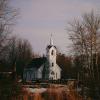
We cannot associate the worship of God with our particular church structure, as they seem to have done. But we misunderstand these writers if we suppose that all they were thinking about was the building. Actually, their true delight was in God, which is why, in spite of the earlier open passionate pining for God’s house, the psalm ends with blessing for the person who simply trusts God. It is a way of saying that in the final analysis this is what truly matters and what life is about.

However, at this point there is a three-part outline that can move us forward. It is the three blessings or beatitudes found in verses 4, 5 and 12. They make a progression. The first is for those who live and work in the temple. The second is for those who are on their way to it, for pilgrims. The third, which we will look at in tomorrow's study, is for those who cannot get to the temple but who place their faith in God.

Have you found rest in God, or are you still wandering and restless, as so many persons are? God offers you peace. Even the swallow found “a nest for herself where she may have her young—a place near your altar.”

It is a psalm of people who were present in the temple, who served in God’s house, and who are expressing here how intensely their very souls yearned and even fainted for God. They are saying that their souls yearn for God’s house not because they are separated from it, but because that is where they are and want to be. It is why they are serving.

All of the Psalter’s psalms are beautiful, profound and poignant, but some stand out above the rest, and Psalm 84 is one of them. For its high and uplifting sentiment, the simplicity and exquisite beauty of its images and its moving aspirations, it may be unequaled anywhere.


















